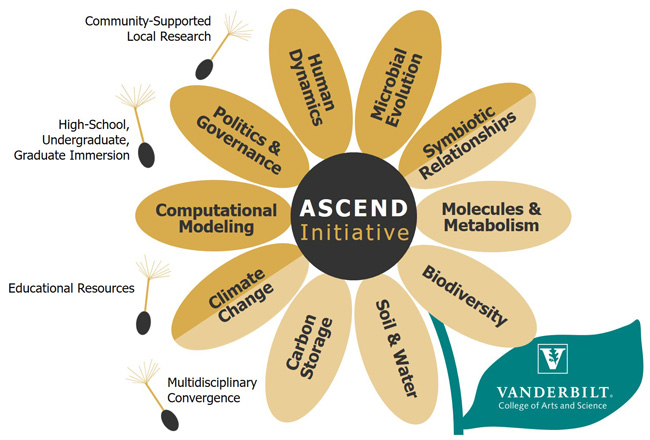- Diaz S, Settele J, Brondízio E, et al., IPBES: Intergovernmental Science-Policy Platform on Biodiversity and Ecosystem Services (2019). Global Assessment Report on Biodiversity and Ecosystem Services. Retrieved from https://ipbes.net/global-assessment-report-biodiversity-ecosystem-services
- Hallmann CA, Sorg M, Jongejans E, Siepel H, Hofland N, et al. More than 75 percent decline over 27 years in total flying insect biomass in protected areas. PLOS ONE 12:10 (2017).
- IPCC: Intergovernmental Panel on Climate Change (2018). Special Report: Global Warming of 1.5ºC. Retrieved fromhttps://www.ipcc.ch/sr15/
- Cavicchioli R, Ripple WJ, Timmis KN et al. Scientists’ warning to humanity: microorganisms and climate change. Nat Rev Microbiol 17, 569–586 (2019).
- Toju H, Peay KG, Yamamichi M et al. Core microbiomes for sustainable agroecosystems. Nature Plants 4, 247–257 (2018).
- Altieri MA, Nicholls CI, The adaptation and mitigation potential of traditional agriculture in a changing climate, Climatic Change140:33 (2017).
- Busby PE, Soman C, Wagner MR, Friesen ML, Kremer J, Bennett A, et al. Research priorities for harnessing plant microbiomes in sustainable agriculture. PLoS Biol 15:3 (2017).
- Lange, M., Eisenhauer, N., Sierra, C. et al. Plant diversity increases soil microbial activity and soil carbon storage. Nat Commun 6, 6707 (2015).
- Alori ET, Babalola OO, Microbial Inoculants for Improving Crop Quality and Human Health in Africa, Front Microbiol 9, 2213 (2018).
- Wall DH, Nielsen UN, Six J, Soil biodiversity and human health, Nature 528, 69-76 (2015).
- Lechtenfeld O, Hertkorn N, Shen Y et al. Marine sequestration of carbon in bacterial metabolites. Nat Commun 6, 6711 (2015).
- Abhilash PC, Dubey RK, Tripathi V, Gupta VK, Singh HB, Plant Growth-Promoting Microorganisms for Environmental Sustainability, Trends Biotechnol 34:11, 847-850 (2016).
- Kucharzyk KH, Darlington R, Benotti M, Deeb R, Hawley E, Novel treatment technologies for PFAS compounds: A critical review, Journal of Environmental Management 204:2, 757-764 (2017).
Overview
The Grand Challenge
Every component in an ecological system is of vital importance to its overall health and integrity. Human activity has been disrupting Earth’s environment and ecology to the point that we are now facing catastrophic and compounding threats to biodiversity and food security, increased spread of infectious diseases with loss of antibiotic drugs, broad environmental pollution from plastics and toxicants, and extreme weather events leading to desertification, flooding, crop failures, wildfires, and sea-level rise. The Intergovernmental Platform on Biodiversity and Ecosystem Services’ (IPBES) 2019 report outlines that more than a quarter of species currently face extinction. Similarly, recent studies in Germany report a 75% decrease in total insect biomass in the past 27 years while losses in other countries such as the United States are unknown.1,2 The Intergovernmental Panel on Climate Change (IPCC) reported in 2018 on the importance of keeping global warming below 1.5°C, warning that due to thermal inertia only a small window of time exists to sufficiently address carbon and other greenhouse gas emissions in order to stay within these limits.3
A recent consensus statement published in Nature Reviews Microbiology reports that microorganisms not only play a central role in climate change biology by releasing or consuming greenhouse gases but also provide many key opportunities for a more sustainable future.4 As such, sustainable agroecosystems are needed that not only prioritize ecological diversity and optimize plant-microbial and animal-microbial relationships, but that also remediate pollution and sequester greenhouse gases.5-10 Meanwhile, benefits of microbes are being discovered that can sequester carbon from the atmosphere, increase crop resiliency to climate change, limit the spread of invasive species, and even detoxify environmental pollutants or “forever chemicals”.11-13
ASCEND Goals
| ASCEND brings together experts from biological sciences, chemistry, earth and environmental sciences, mathematics, sociology, and political science to form a resource and build tools for transdisciplinary immersion research and community-sourced solutions.
This Initiative is aimed at collaborating with local communities, providing learning opportunities, and fostering student research immersion to advance actionable solutions and affect positive ecological change under climate change pressure.
|
 |
Short-Term Goals
- Develop project resources and an online portal for community-supported science.
- Provide multidisciplinary pilot project immersion opportunities for students.
- Assemble educational, outreach, and dissemination resources to support the active engagement of local communities.
- Foster multidisciplinary convergence research around ecological health and climate change challenges.
Long-Term Goals
- Investigate ecological health and climate change dynamics by uncovering interactions of environmental microbiomes, local biodiversity, and environmental toxins and toxicants.
- Use scientific discoveries to develop solutions toward remediation, regeneration, and protection.
- Build local community partnerships to increase the impact of discoveries and knowledge.
- Engage policymakers to foster greater support of ecological health and climate change protection.
Current Support
| The ASCEND Initiative is part of the College of Arts and Science’s Grand Challenge Initiative that supports experts across many fields of study to address some of society’s biggest challenges.
Donors interested in supporting the ASCEND Initiative should please contact Jonathan Petty, Associate Dean of Development for the College of Arts and Science, at jonathan.petty@vanderbilt.edu or (615) 322-8119. |
 |
